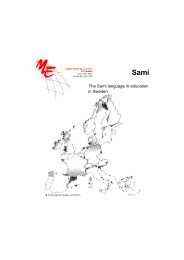Multilingual Early Language Transmission (MELT) - Mercator ...
Multilingual Early Language Transmission (MELT) - Mercator ...
Multilingual Early Language Transmission (MELT) - Mercator ...
You also want an ePaper? Increase the reach of your titles
YUMPU automatically turns print PDFs into web optimized ePapers that Google loves.
Ireland). This required qualification at FETAC (at Level 5 or equivalent) in childcare/ early<br />
childhood care and education usually includes four mandatory component awards related to<br />
the required skills and knowledge needed for practice in early childhood care and education<br />
settings, e.g. Child Development, <strong>Early</strong> Childhood Education, Working in Childcare; two<br />
general component awards (mandatory), one being work experience/practice-related and<br />
another drawn from a list of core skills areas such as. Communication, Information<br />
Technology (IT); and two component awards drawn from a pool of elective subjects which<br />
may relate to specific areas of practice in early childhood care and education. In the case of<br />
the Leaders who are training to work in naíonraí, these include modules relevant to<br />
supporting L2 through immersion, and these are discussed below.<br />
Training for Immersion Preschools<br />
The umbrella body for the naíonraí, Forbairt Naíonraí Teo (FNT) states that there are three<br />
requirements for employment as a naíonra Leader: a FETAC 5 qualification or higher<br />
required for all working in the <strong>Early</strong> Years’ sector, as described above; a high standard of<br />
Irish; and completion of its own Intensive Course (full-time for one week). A significant step<br />
has been the provision by FNT of the general FETAC training courses at levels 5 and 6<br />
through Irish. Offering these general courses through the medium of Irish offers important<br />
professional development for fluent Irish speakers, as well as further language development<br />
in the register required to work in this section. In addition, it allows that the optional<br />
modules included can be tailored to Irish-medium preschools. As a result, modules such as<br />
‘Using Irish with young children’ and ‘Sociolinguistics and the child’ are included, which<br />
address the methodology of immersion for L2 learners and language support for L1<br />
speakers. This follows on the research by Hickey (1997) which explored the needs and<br />
challenges facing Stiúrthóirí (Leaders) and recommended training that specifically targeted<br />
language use with L2 learners, as well as offering those working in Irish-medium areas<br />
training in the impact of sociolinguistic factors on language use in those areas, as well as<br />
extending the preparation for dealing with children who were native speakers but had<br />
limited or insufficiently developed mother-tongue skills.<br />
The higher qualification, FETAC Level 6, is also offered in Irish by FNT and qualifies holders<br />
for a higher subvention under the national scheme, and this course also includes a module<br />
specifically directed at <strong>Language</strong> Planning in the Preschool. This addresses some of the<br />
concerns from previous research (e.g. Hickey, 2007) showing the difficulty of meeting the<br />
different needs of learners at different levels of fluency without language planning efforts. A<br />
textbook to accompany these courses has been developed in order to support the Leaders’<br />
study through Irish (Cúnamh, edited by Uí Ghrádaigh 2004) and this contains materials in<br />
Irish relevant to these courses<br />
<strong>Language</strong> Proficiency<br />
The naíonraí are committed to an <strong>Early</strong> Total Immersion approach, where all activities are<br />
managed only through Irish, and where the only language spoken with children and other<br />
staff is Irish. In order to ensure that the approach used in the naíonraí is Total Immersion,<br />
Leaders must be fluent in the language, defined by FNT as being ‘confident and comfortable<br />
104



